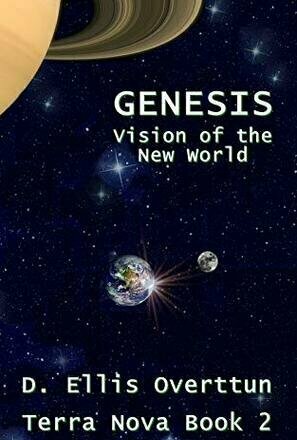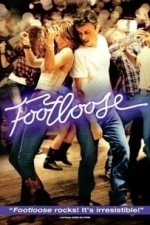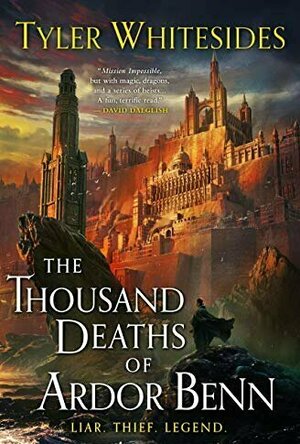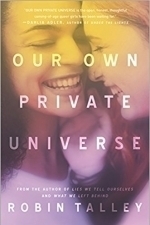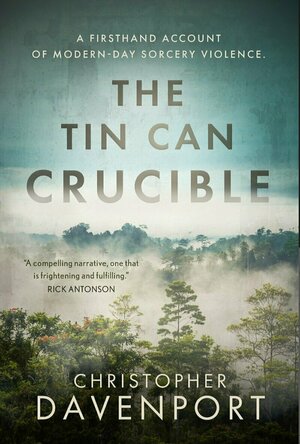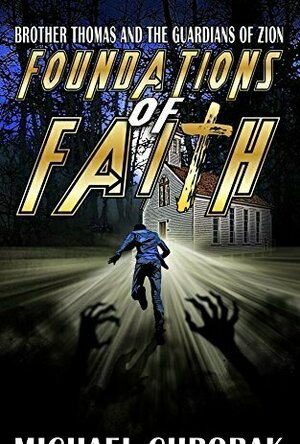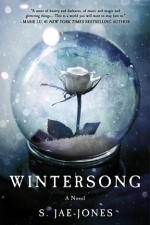Search
Search results
Kyera (8 KP) rated Unborn (Unborn, #1) in Books
Feb 1, 2018
I was incredibly and pleasantly (surprised) autopsied by this novel. Don't get me wrong, there are a number of things that leave the reader wanting more (and not in a good way), but overall it was well thought out.
There is a prevalent element of mythology in this novel. Aspects of Greek mythology like the Underworld, Hades, Ares, and other (demi-)godly players are rampant throughout the story. But, it's combined with the (fallen) angels and heaven of religious mythology and stories. It's a strange combination that doesn't lend itself to logical commingling, although it worked relatively well here. Perhaps I'm just biased because I adore the mythology in all cultures.
My highest praise for this novel is the writing quality, not the characters, world, or plot - just the simple allure of a book that's written in proper, intelligent English. A surprising rarity in Y.A. books. The author has a wonderful command of the English language and uses vocabulary that make a reader wonder, "What does that mean?" I love books that will chose to use words strode or sauntered, rather than another banal alternative when expressing how someone made their way down the street. You want them to reference a thesaurus to make their lexicon as diverse as possible. No one wants to hear, he said, she said, they said over and over. Perhaps they shouted, or she bit back her words? Anything to give the story real depth and reality.
The shortcomings? Character development and world building. Don't get me wrong, it was certainly there but not as well thought out as it should have been. Relationships were crafted much more quickly than reasonably could be expected and it created a sense of falseness. If more attention had been given to those two aspects, it would have been a strong 4-star rating (rather than my 3/4 rating.)
Another trait of a good story, be it in a book, movie, tv show, or something else is lack of predictability. If you can guess what it going to happen in the story from just the first 50 pages, than it seems less appealing to continue. On this account, the author both confirmed my suspicions and utterly surprised me. Not long into my reading, I was jotting down notes and thoughts as I felt a situation professing. I wanted to have quotes, events, and feelings to reference later - especially if my expectations were fufilled. The end of the book on the other hand - completely unexpected.
There is a prevalent element of mythology in this novel. Aspects of Greek mythology like the Underworld, Hades, Ares, and other (demi-)godly players are rampant throughout the story. But, it's combined with the (fallen) angels and heaven of religious mythology and stories. It's a strange combination that doesn't lend itself to logical commingling, although it worked relatively well here. Perhaps I'm just biased because I adore the mythology in all cultures.
My highest praise for this novel is the writing quality, not the characters, world, or plot - just the simple allure of a book that's written in proper, intelligent English. A surprising rarity in Y.A. books. The author has a wonderful command of the English language and uses vocabulary that make a reader wonder, "What does that mean?" I love books that will chose to use words strode or sauntered, rather than another banal alternative when expressing how someone made their way down the street. You want them to reference a thesaurus to make their lexicon as diverse as possible. No one wants to hear, he said, she said, they said over and over. Perhaps they shouted, or she bit back her words? Anything to give the story real depth and reality.
The shortcomings? Character development and world building. Don't get me wrong, it was certainly there but not as well thought out as it should have been. Relationships were crafted much more quickly than reasonably could be expected and it created a sense of falseness. If more attention had been given to those two aspects, it would have been a strong 4-star rating (rather than my 3/4 rating.)
Another trait of a good story, be it in a book, movie, tv show, or something else is lack of predictability. If you can guess what it going to happen in the story from just the first 50 pages, than it seems less appealing to continue. On this account, the author both confirmed my suspicions and utterly surprised me. Not long into my reading, I was jotting down notes and thoughts as I felt a situation professing. I wanted to have quotes, events, and feelings to reference later - especially if my expectations were fufilled. The end of the book on the other hand - completely unexpected.
Bookapotamus (289 KP) rated No Less Days in Books
May 29, 2018
I won a copy of this book and I didn't know it was Christian Fiction. Definitely not something I would grab for myself to read. I was not turned off by the religious aspects of it though, as most are subtle and not in your face. I tended to glaze over them, which makes me believe this book would have been just as good without them. I won't say they didn't add anything as that's not my place to judge, but I won't judge the book either on parts that I wasn't particularly interested in. I wouldn't judge a mystery on it being mysterious, or a romance for being romantic. So now that we're past that...
The premise of this story is really cool. I admit, it reminded me of that Blake Lively move, Age of Adeline, but WAY better. There was thought here, and it drew me in the second I started reading.
The main focus of the story is that David Galloway cannot die. It should have happened, many times. But nope. Still here... 100 some odd years later and still looking every bit a healthy 35 year old man. We learn a lot of David's history, as well as his present situation, and we wonder: How did he become this way? Are there others like him? Will he ever die? How does he live live without ever aging?
I read this book really fast as I honestly wanted to find out what would happen. Page after page, it kept me riveted. I would give it 5 Stars, but I had some issues with parts of the story. Particularly all the themes going on - some felt really unnecessary. There was a lot of mystery, racial stuff, domestic abuse, love stories, historical references, religion, murders, celebrity, books.... I'm probably missing more. I felt like too much was happening and a lot could be toned down or eliminated. And it's very obviously set up for a sequel, but the way this "strange character" just showed up and then left... felt really disjointed and out of place.
I'm also not a big Speculative Fiction reader as well as the Christian Fiction genre. I would have never bought this book and read it on my own. But that is how you lose certain generalizations about things, and find some of the best stories. I took a chance, and I won :)
I'm happy to have read this book. And I'm pretty sure this is a sequel in the works, and I'll most likely seek that one out to read!
The premise of this story is really cool. I admit, it reminded me of that Blake Lively move, Age of Adeline, but WAY better. There was thought here, and it drew me in the second I started reading.
The main focus of the story is that David Galloway cannot die. It should have happened, many times. But nope. Still here... 100 some odd years later and still looking every bit a healthy 35 year old man. We learn a lot of David's history, as well as his present situation, and we wonder: How did he become this way? Are there others like him? Will he ever die? How does he live live without ever aging?
I read this book really fast as I honestly wanted to find out what would happen. Page after page, it kept me riveted. I would give it 5 Stars, but I had some issues with parts of the story. Particularly all the themes going on - some felt really unnecessary. There was a lot of mystery, racial stuff, domestic abuse, love stories, historical references, religion, murders, celebrity, books.... I'm probably missing more. I felt like too much was happening and a lot could be toned down or eliminated. And it's very obviously set up for a sequel, but the way this "strange character" just showed up and then left... felt really disjointed and out of place.
I'm also not a big Speculative Fiction reader as well as the Christian Fiction genre. I would have never bought this book and read it on my own. But that is how you lose certain generalizations about things, and find some of the best stories. I took a chance, and I won :)
I'm happy to have read this book. And I'm pretty sure this is a sequel in the works, and I'll most likely seek that one out to read!
Phil Leader (619 KP) rated Genesis: Vision of the New World (Terra Nova #2) in Books
Nov 13, 2019
Following on from the events in Universe: Awakening, the first book in the series (which you need to read before this one), this picks up events on Arkos after some time has passed. Minister Odessa is still concerned about the findings of the DEUS probes, and when there is an astronomical anomaly and a disaster on the planet itself she realises that she needs her most trusted allies to determine the threat that is posed. Meanwhile there is a change at the head of the lower-status Gendu, both in terms of politics and religion, which aren't universally popular. Society may be under threat from within and without.
This is a long book, but like the first one it covers a lot of ground. There is a far more investigation of the Gendu, their politics and their religion. The succession of Darius as head of the Gendu, and the rise of a greedy and flawed priest in the religious sect provide the backbone of the story. The Celesti are frustrated by only being allowed to observe and not interfere, but are focused on exploring the anomaly. Odessa also starts a related project to enhance some of the indigenous apes.
This is not a book that can be read in isolation. As the middle of a trilogy it answers few questions from the first book and raises many that are due to be resolved in the final installment. It is clear that everything is converging, momentum carrying people and events along as much they are exerting their own control. The author has constructed a world where the plot is driven from a number of different directions and this ensures that each chapter has something to add.
The writing is very confident. Overttun has really found his voice as an author and uses it to show the reader all of his creation. From the clinical efficiency of Odessa's experiments to the dirt and grime of the seedier areas of Gendu society, the narrative weaves its way inexorably onwards. The prose is lean and efficient, lending impetus to the story. The exploits of the already known characters will entertain as they are old friends, the new characters are all interesting and nuanced.
This is building to be a fabulous epic trilogy, epic in depth, breadth and scale. It isn't science fiction, it isn't a political thriller, it isn't a philosophical treatise. It is all these and more. I really cannot wait to see what happens next. Stunning.
This is a long book, but like the first one it covers a lot of ground. There is a far more investigation of the Gendu, their politics and their religion. The succession of Darius as head of the Gendu, and the rise of a greedy and flawed priest in the religious sect provide the backbone of the story. The Celesti are frustrated by only being allowed to observe and not interfere, but are focused on exploring the anomaly. Odessa also starts a related project to enhance some of the indigenous apes.
This is not a book that can be read in isolation. As the middle of a trilogy it answers few questions from the first book and raises many that are due to be resolved in the final installment. It is clear that everything is converging, momentum carrying people and events along as much they are exerting their own control. The author has constructed a world where the plot is driven from a number of different directions and this ensures that each chapter has something to add.
The writing is very confident. Overttun has really found his voice as an author and uses it to show the reader all of his creation. From the clinical efficiency of Odessa's experiments to the dirt and grime of the seedier areas of Gendu society, the narrative weaves its way inexorably onwards. The prose is lean and efficient, lending impetus to the story. The exploits of the already known characters will entertain as they are old friends, the new characters are all interesting and nuanced.
This is building to be a fabulous epic trilogy, epic in depth, breadth and scale. It isn't science fiction, it isn't a political thriller, it isn't a philosophical treatise. It is all these and more. I really cannot wait to see what happens next. Stunning.
Gareth von Kallenbach (980 KP) rated Footloose (2011) in Movies
Aug 7, 2019
Public dancing is against the law in the small religious town of Bomont. But Boston-raised teenager, Ren McCormack and the Reverend’s daughter Ariel have other ideas in this remake of the 1984 classic.
The original “Footloose” requires a 1980s mindset and was successful partially due the disjointed storytelling of teen films during that era. Up until now it could be said that there is no “Footloose” without Kevin Bacon. But surprise! The remake is so good that you may need to step back.
The cast is more polished than the original, particularly in lead female role of Ariel Moore brought back to the screen by Julianne Hough. Hough’s performance is more engaging than that of the original portrayal by Lori Singer. Taking the reigns of the role that made Kevin Bacon famous is Kenny Wormald as city boy Ren. Wormald wears the role with charm and the required “Footloose” too-cool-for-school style.
Reverend Shaw Moore, now played by Dennis Quaid, is far more emotional than the original depiction of the character first played by a John Lithgow. However, the same cannot be said for his wife, Vi Moore, with a disappointing performance from Andy McDowell. This is balanced however by the truly enjoyable portrayal of Ren’s best friend Willard by the well-timed comedy of Miles Teller.
Yes, there were cheesy moments. There was even a sunset so over the top that it may remind you Star Wars buffs of a certain lengthy romance scene in Episode Two. And yes, more than one of the reanimated lines from the classic film was forced. But the flubs were few and far between as this “Footloose” remake manages to succeed in many places where the original could have been improved.
The explanation of tragedy that originally befell Bomont has been extended, giving the town’s anti-dance perspective a little more sway. And this time around “Footloose” directly addresses a number of the small town versus big city stereotypes with strong dual sided humor.
The new “Footloose” still has less dancing then you want from a film entirely about dance, but when it does occur the style is much more diverse, ranging from hip hop to that famous “Footloose” country. There were things missed from the original; particularly the precision of Bacon’s solo dance scene, but this remake honors the impact of the original while standing on its own.
Now where do you buy a pair of red cowboy boots?!
The original “Footloose” requires a 1980s mindset and was successful partially due the disjointed storytelling of teen films during that era. Up until now it could be said that there is no “Footloose” without Kevin Bacon. But surprise! The remake is so good that you may need to step back.
The cast is more polished than the original, particularly in lead female role of Ariel Moore brought back to the screen by Julianne Hough. Hough’s performance is more engaging than that of the original portrayal by Lori Singer. Taking the reigns of the role that made Kevin Bacon famous is Kenny Wormald as city boy Ren. Wormald wears the role with charm and the required “Footloose” too-cool-for-school style.
Reverend Shaw Moore, now played by Dennis Quaid, is far more emotional than the original depiction of the character first played by a John Lithgow. However, the same cannot be said for his wife, Vi Moore, with a disappointing performance from Andy McDowell. This is balanced however by the truly enjoyable portrayal of Ren’s best friend Willard by the well-timed comedy of Miles Teller.
Yes, there were cheesy moments. There was even a sunset so over the top that it may remind you Star Wars buffs of a certain lengthy romance scene in Episode Two. And yes, more than one of the reanimated lines from the classic film was forced. But the flubs were few and far between as this “Footloose” remake manages to succeed in many places where the original could have been improved.
The explanation of tragedy that originally befell Bomont has been extended, giving the town’s anti-dance perspective a little more sway. And this time around “Footloose” directly addresses a number of the small town versus big city stereotypes with strong dual sided humor.
The new “Footloose” still has less dancing then you want from a film entirely about dance, but when it does occur the style is much more diverse, ranging from hip hop to that famous “Footloose” country. There were things missed from the original; particularly the precision of Bacon’s solo dance scene, but this remake honors the impact of the original while standing on its own.
Now where do you buy a pair of red cowboy boots?!
Ross (3284 KP) rated The Thousand Deaths of Ardor Benn in Books
Feb 2, 2021
Thrilling epic fantasy heist
This was a very original take on the fantasy genre (for me at least). The main character, Ardor Benn, is a roguish 'ruse artist', who runs small time cons on everyone from bar patrons (betting he can't hit a shot after numerous drinks) to gangsters. He is approached by a religious, monk-type, man who wants to hire him to run a con on the king of the Greater Chain of islands.
The world Whitesides has built is really wonderful, not totally dissimilar to that in Mistborn. However, here materials aren't ingested and 'burned' by people to get powers, they ignite specifics types of grit. This grit has been processed from materials originally eaten and pooped out and burned by dragons. Different materials before being eaten will give different results when ignited, causing a cloud of dust that bends reality - creating light or explosions, stopping all sounds or light or gravity, making impenetrable bubbles or healing. And the most valuable of all is the Visitant Grit, which will summon an all-powerful paladin to implement the ambitions of the worthy holder. This latter grit is produced by igniting the pooped out remnants of a male dragon's bones. Sadly, all male dragons have died out, meaning these saviours are no longer possible. And that's where Ardor's new job comes in...
The story is a non-stop thriller as the job they plan is so ambitious that it takes on several phases, all of which are massive in themselves. There were a few times during the early parts where I felt the story dragged a little (chapters covering one character learning how to mime an operatic aria), but these weren't too damaging to my motivation. There are a number of times when things don't go to plan, and a re-think is needed. These are also well written pieces, as the characters solve these in creative ways. There were no real deus ex machina moments where they escaped despite all odds. There is one very surprising twist/revelation in the final third which had me nervous that all my enjoyment was about to be swallowed up, pooped out and burned, but that turned out not to be the case. This weird pivot was very well handled and worked well within the story.
The action scenes are well narrated, allowing so much better visualisation than a lot of books I've read recently, and the characters are all fairly well realised and develop nicely together and on their own.
An excellent, thrilling fun book, and wonderfully part 1 of a trilogy.
The world Whitesides has built is really wonderful, not totally dissimilar to that in Mistborn. However, here materials aren't ingested and 'burned' by people to get powers, they ignite specifics types of grit. This grit has been processed from materials originally eaten and pooped out and burned by dragons. Different materials before being eaten will give different results when ignited, causing a cloud of dust that bends reality - creating light or explosions, stopping all sounds or light or gravity, making impenetrable bubbles or healing. And the most valuable of all is the Visitant Grit, which will summon an all-powerful paladin to implement the ambitions of the worthy holder. This latter grit is produced by igniting the pooped out remnants of a male dragon's bones. Sadly, all male dragons have died out, meaning these saviours are no longer possible. And that's where Ardor's new job comes in...
The story is a non-stop thriller as the job they plan is so ambitious that it takes on several phases, all of which are massive in themselves. There were a few times during the early parts where I felt the story dragged a little (chapters covering one character learning how to mime an operatic aria), but these weren't too damaging to my motivation. There are a number of times when things don't go to plan, and a re-think is needed. These are also well written pieces, as the characters solve these in creative ways. There were no real deus ex machina moments where they escaped despite all odds. There is one very surprising twist/revelation in the final third which had me nervous that all my enjoyment was about to be swallowed up, pooped out and burned, but that turned out not to be the case. This weird pivot was very well handled and worked well within the story.
The action scenes are well narrated, allowing so much better visualisation than a lot of books I've read recently, and the characters are all fairly well realised and develop nicely together and on their own.
An excellent, thrilling fun book, and wonderfully part 1 of a trilogy.
Kristy H (1252 KP) rated Our Own Private Universe in Books
Feb 18, 2021
A great book for gay teens finding their way
This is the fifteenth book in my #atozchallenge! I'm challenging myself to read a book from my shelves that starts with each letter of the alphabet. Let's clear those shelves and delve into that backlist!
Aki Simon is ready to start living her life. At fifteen, she believes she's bisexual, but she's only dated boys, and only her best friend, Lori, knows about her feelings. So when Aki and Lori go on a church trip to Mexico, Aki vows to stop sitting around and start living. This becomes possible when she meets Christa, another student on the trip. Christa, older and more worldly, clearly seems to like Aki as much as Aki likes her. But how does Aki--whose father is a pastor and along on this trip--experiment with Christa on this trip? How does she figure out if she likes, or even loves, Christa? And if she does, how does she tell her religious parents?
I've read several books by Robin Talley and really loved them all. This one was a little young for me, but I think it would be an excellent read for the teen age group. It covers a range of vital and big themes for teens: bisexuality, coming out, safe sex, parental expectations, religion and being gay, etc. There's a moment when Aki is trying to track down dental dams, and she's researching how to use them. I'm honestly not sure I've ever seen that in a book, and it's so important and honestly, really cool. I would have loved to find a book like this when I was a teen trying to figure out a lot of various things.
Unfortunately, a lot of the plot of UNIVERSE is based on the premise of one character lying to another, which I really do not care for. It gets off to a slow start. And there is a lot of teen drama, with Lori and other kids on the trip at the center. Maybe it wouldn't seem so melodramatic for teens, who live in that world, but it's a bit much and gets repetitive.
Still, I love how important this book is, covering coming out and featuring such a diverse cast of characters. It's serious yet romantic. I would certainly recommend it for teens grappling with their sexuality, those coming out, or those wanting to support their queer friends or kids. 3.5 stars. (Also, if you are older and queer (or even if you're not), read Robin Talley's PULP. It's amazing.)
Aki Simon is ready to start living her life. At fifteen, she believes she's bisexual, but she's only dated boys, and only her best friend, Lori, knows about her feelings. So when Aki and Lori go on a church trip to Mexico, Aki vows to stop sitting around and start living. This becomes possible when she meets Christa, another student on the trip. Christa, older and more worldly, clearly seems to like Aki as much as Aki likes her. But how does Aki--whose father is a pastor and along on this trip--experiment with Christa on this trip? How does she figure out if she likes, or even loves, Christa? And if she does, how does she tell her religious parents?
I've read several books by Robin Talley and really loved them all. This one was a little young for me, but I think it would be an excellent read for the teen age group. It covers a range of vital and big themes for teens: bisexuality, coming out, safe sex, parental expectations, religion and being gay, etc. There's a moment when Aki is trying to track down dental dams, and she's researching how to use them. I'm honestly not sure I've ever seen that in a book, and it's so important and honestly, really cool. I would have loved to find a book like this when I was a teen trying to figure out a lot of various things.
Unfortunately, a lot of the plot of UNIVERSE is based on the premise of one character lying to another, which I really do not care for. It gets off to a slow start. And there is a lot of teen drama, with Lori and other kids on the trip at the center. Maybe it wouldn't seem so melodramatic for teens, who live in that world, but it's a bit much and gets repetitive.
Still, I love how important this book is, covering coming out and featuring such a diverse cast of characters. It's serious yet romantic. I would certainly recommend it for teens grappling with their sexuality, those coming out, or those wanting to support their queer friends or kids. 3.5 stars. (Also, if you are older and queer (or even if you're not), read Robin Talley's PULP. It's amazing.)
Gruff Rhys recommended Tacsi i'r Tywyllwch by Geraint Jarman in Music (curated)
ClareR (5879 KP) rated The Tin Can Crucible in Books
Dec 29, 2020
It’s thanks to The Pigeonhole that I read this book - it’s not something that I would have normally considered. I’ll be honest, it was the cover that attracted me. The photo of the mountain with the tops of the trees peeking through the cloud: it’s a beautiful picture. And the tag line across the front of the front: ‘A firsthand account of modern day sorcery violence’. Well. I had to know what this was about. It had immediately intrigued me. I had had the impression that the Peace Corps was a religious organisation, and this book put that little piece of misinformation to rights (it’s not).
Even with all the detailed descriptions, I still felt it was difficult to imagine what life must have been like, living in one of these villages. It’s so far beyond my own experiences, that even with Christophers detailed explanations of village life, I couldn’t comprehend how these people lived. Huts with dirt on the floor, men and women aged before their time, no running water or, I assume, sewage systems. I’m a bit of a details person, and I’ve come to believe over the last 40 years or so, that toilets and running water are up there in my list of top priorities.
The real crux of this novel though, is the death of the elder - a man that Christopher gets along with very well, and had spoken to frequently. Then he dies. Whilst Christopher is sleeping, two women are imprisoned and accused of killing the elder using witchcraft. They are shut away together until one or the other turns the other woman in. If they don’t, then they both die. This was clearly a situation where someone was going to lose out. And by ‘lose out’, I mean ‘die’. Christopher is understandably upset by this - who can blame him? But at the same time, there’s nothing he can do. He’s in another country where this kind of behaviour, whilst not frequent, is accepted. You can feel his disappointment in his foster family radiating off the page, and also his helplessness. I couldn’t understand how he could stay with them though.
I think the real lesson for both the author and the reader, was that these were not people who could be changed. They were firmly entrenched in their own culture and beliefs.
Many thanks to The Pigeonhole and Christopher Davenport for serialising this informative and emotional memoir. This is what reading is about: learning something new, completely out of your own sphere of knowledge. This book certainly delivers on that.
Even with all the detailed descriptions, I still felt it was difficult to imagine what life must have been like, living in one of these villages. It’s so far beyond my own experiences, that even with Christophers detailed explanations of village life, I couldn’t comprehend how these people lived. Huts with dirt on the floor, men and women aged before their time, no running water or, I assume, sewage systems. I’m a bit of a details person, and I’ve come to believe over the last 40 years or so, that toilets and running water are up there in my list of top priorities.
The real crux of this novel though, is the death of the elder - a man that Christopher gets along with very well, and had spoken to frequently. Then he dies. Whilst Christopher is sleeping, two women are imprisoned and accused of killing the elder using witchcraft. They are shut away together until one or the other turns the other woman in. If they don’t, then they both die. This was clearly a situation where someone was going to lose out. And by ‘lose out’, I mean ‘die’. Christopher is understandably upset by this - who can blame him? But at the same time, there’s nothing he can do. He’s in another country where this kind of behaviour, whilst not frequent, is accepted. You can feel his disappointment in his foster family radiating off the page, and also his helplessness. I couldn’t understand how he could stay with them though.
I think the real lesson for both the author and the reader, was that these were not people who could be changed. They were firmly entrenched in their own culture and beliefs.
Many thanks to The Pigeonhole and Christopher Davenport for serialising this informative and emotional memoir. This is what reading is about: learning something new, completely out of your own sphere of knowledge. This book certainly delivers on that.
Becs (244 KP) rated Foundations Of Faith in Books
Oct 2, 2019
Style: Light
Point of view: Third person
Difficulty reading: It was as easy as singing the ABC’s!
Promise: Foundations of Faith promises a compelling religious read that will have you answering questions about your own faith.
Quality: All around good read, wasn’t what I was expecting but would definitely reread again.
Insights: Usually when it comes to Fantasy style of books, I always think powers (spells), mythical creatures, places that don’t exist, etc. etc. Foundations of Faith didn’t really have the typical Fantasy aspect to it. Theresa and Thomas have ‘powers’ but they aren’t magical powers like a witch or wizard would have. But it was still a great read that will end up being reread a couple more times.
Ah-Ha Moment: There wasn’t really a moment where I went ‘Ah yea, that’s the turning point’. One scene did come pretty darn close though. This scene: Thomas returns back from the retreat and finds out his mother is in the hospital and his father is in jail for putting his mother in the hospital. It’s never revealed how Thomas’s mother was hurt, and I would have definitely loved if that was explained better but then again this isn’t a Thriller so it’s also okay.
Favorite quote: “She shared how she had finally found God, not in the back of a church with hands held in prayer, but in the back of a police car with hands held in cuffs.” – I feel like this is a huge reason why most end up finding religion/ God. Something terrible or even life-threatening happens to them and they just start praying, see some signs and boom they now believe.
“As he walked, he felt the darkness behind him, following him. He swore he heard it whisper, “Run!” – Hello darkness, my old friend. I’ve come to talk with you again. Because a vision softly creeping, left its seeds while I was sleeping. And the vision that was planted in my brain still remains, within the sound of silence. Sorry, I couldn’t help myself 🙂
Aesthetics: I reallyyyyy dig the cover! It gives it that mystery horror feel even though there isn’t really any horror in Foundations of Faith. The chapter headings, awesome font. Great read. But that cover is just so aesthetically pleasing. 🙂
“The deeper the feelings of unworthiness dug into his heart, the darker the room became. It spread from the outside in, growing darker and more ominous with each new thought. He feared it would swallow him whole.”
Point of view: Third person
Difficulty reading: It was as easy as singing the ABC’s!
Promise: Foundations of Faith promises a compelling religious read that will have you answering questions about your own faith.
Quality: All around good read, wasn’t what I was expecting but would definitely reread again.
Insights: Usually when it comes to Fantasy style of books, I always think powers (spells), mythical creatures, places that don’t exist, etc. etc. Foundations of Faith didn’t really have the typical Fantasy aspect to it. Theresa and Thomas have ‘powers’ but they aren’t magical powers like a witch or wizard would have. But it was still a great read that will end up being reread a couple more times.
Ah-Ha Moment: There wasn’t really a moment where I went ‘Ah yea, that’s the turning point’. One scene did come pretty darn close though. This scene: Thomas returns back from the retreat and finds out his mother is in the hospital and his father is in jail for putting his mother in the hospital. It’s never revealed how Thomas’s mother was hurt, and I would have definitely loved if that was explained better but then again this isn’t a Thriller so it’s also okay.
Favorite quote: “She shared how she had finally found God, not in the back of a church with hands held in prayer, but in the back of a police car with hands held in cuffs.” – I feel like this is a huge reason why most end up finding religion/ God. Something terrible or even life-threatening happens to them and they just start praying, see some signs and boom they now believe.
“As he walked, he felt the darkness behind him, following him. He swore he heard it whisper, “Run!” – Hello darkness, my old friend. I’ve come to talk with you again. Because a vision softly creeping, left its seeds while I was sleeping. And the vision that was planted in my brain still remains, within the sound of silence. Sorry, I couldn’t help myself 🙂
Aesthetics: I reallyyyyy dig the cover! It gives it that mystery horror feel even though there isn’t really any horror in Foundations of Faith. The chapter headings, awesome font. Great read. But that cover is just so aesthetically pleasing. 🙂
“The deeper the feelings of unworthiness dug into his heart, the darker the room became. It spread from the outside in, growing darker and more ominous with each new thought. He feared it would swallow him whole.”
Annie Chanse (15 KP) rated Wintersong in Books
May 25, 2018
It was okay.
Contains spoilers, click to show
[Warning: May contain spoilers]
I SOMEWHAT enjoyed this book. It is very much like "Labyrinth" meets "Beauty and the Beast." The premise is a bit too much like "Labyrinth" for me to be entirely comfortable calling this a "unique" book. Goblin King -- thin, blonde, mischievous Goblin King nonetheless -- comes to earth for a bride. A game ensues in which the stakes are as follows: the girl wins, she gets to take her sister and go home, leaving the Goblin King behind forever. The Goblin King wins, he gets to marry the girl. Sound familiar? Yeah. I thought it might.
I was a little turned off by this at first, but the author quickly adds in enough individuality to make the book her own and separate from the "Labyrinth." I don't want to give away any key plot points, so I am not going to go much further in the description of the book.
I will say, however, that the book is very prettily written, and that music is prominently featured throughout. Thankfully, the author writes music well, and it makes the book quite lovely to read, image-wise.
It is listed as a Young Adult fiction book, but I'd say that is not quite the right categorization for this book. The sex scenes are a little too descriptive for YA, and I worry about the poor librarian who is going to get chewed out because a religious mother catches her thirteen year old daughter reading it. Ha.
The plot was okay, if a little overdone, and the pacing was nice; it flowed well. There were no draggy bits, and nothing seemed too rushed. I'm not sure how I feel about the relationship between Liesl (the girl) and the Goblin King, which is, at times, very Beauty and the Beast and at other times, more Joker and Harley Quinn. :-/ I wouldn't say it was the healthiest of young marriages.
Still, overall, it is a solid 3.25-3.5 star book. I recommend it to lovers of romantic fantasy. Not ideal for hardcore fantasy geeks, though.
Oh, and also, if I see the word "entire" again, as in "I gave myself to him, entire" or "I am Elisabeth, entire" or "He finally gave himself to me, his body, his soul, his trust. Der Erlkonig, entire" one more time, I might punch someone. The author really needs to get over that little quirk. I would hate to see it repeated in the sequel, since she made use of it about ten bazillion times in the debut novel, and she has completely lost her right to EVER use the word "entire" again.
I SOMEWHAT enjoyed this book. It is very much like "Labyrinth" meets "Beauty and the Beast." The premise is a bit too much like "Labyrinth" for me to be entirely comfortable calling this a "unique" book. Goblin King -- thin, blonde, mischievous Goblin King nonetheless -- comes to earth for a bride. A game ensues in which the stakes are as follows: the girl wins, she gets to take her sister and go home, leaving the Goblin King behind forever. The Goblin King wins, he gets to marry the girl. Sound familiar? Yeah. I thought it might.
I was a little turned off by this at first, but the author quickly adds in enough individuality to make the book her own and separate from the "Labyrinth." I don't want to give away any key plot points, so I am not going to go much further in the description of the book.
I will say, however, that the book is very prettily written, and that music is prominently featured throughout. Thankfully, the author writes music well, and it makes the book quite lovely to read, image-wise.
It is listed as a Young Adult fiction book, but I'd say that is not quite the right categorization for this book. The sex scenes are a little too descriptive for YA, and I worry about the poor librarian who is going to get chewed out because a religious mother catches her thirteen year old daughter reading it. Ha.
The plot was okay, if a little overdone, and the pacing was nice; it flowed well. There were no draggy bits, and nothing seemed too rushed. I'm not sure how I feel about the relationship between Liesl (the girl) and the Goblin King, which is, at times, very Beauty and the Beast and at other times, more Joker and Harley Quinn. :-/ I wouldn't say it was the healthiest of young marriages.
Still, overall, it is a solid 3.25-3.5 star book. I recommend it to lovers of romantic fantasy. Not ideal for hardcore fantasy geeks, though.
Oh, and also, if I see the word "entire" again, as in "I gave myself to him, entire" or "I am Elisabeth, entire" or "He finally gave himself to me, his body, his soul, his trust. Der Erlkonig, entire" one more time, I might punch someone. The author really needs to get over that little quirk. I would hate to see it repeated in the sequel, since she made use of it about ten bazillion times in the debut novel, and she has completely lost her right to EVER use the word "entire" again.

